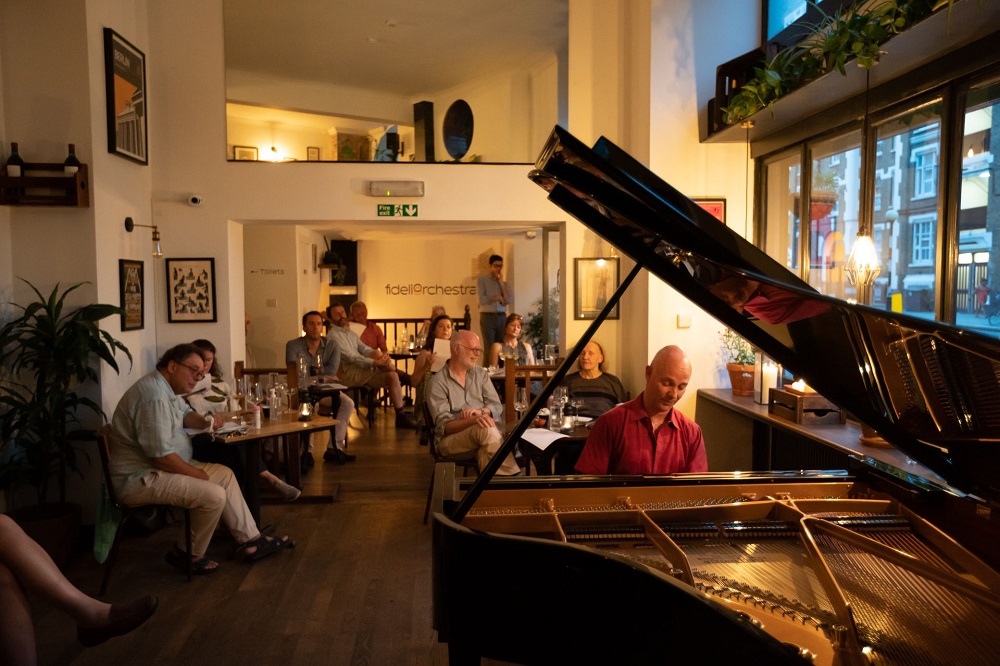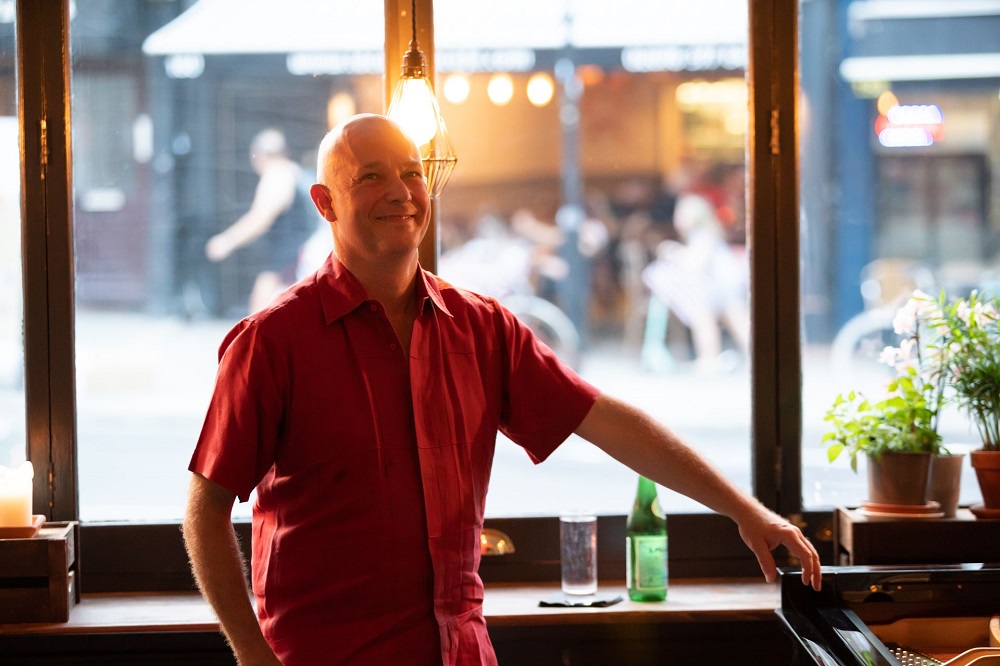Composer Gian-Carlo Menotti once asked rhetorically what society wanted of performing artists – “the bread of life or the after-dinner mint?” There were a couple of audience members last night – unique in my experience so far of the Fidelio Orchestra Café’s set-up – who clearly wanted pianist Charles Owen’s recital to be the pre-dinner amuse-bouche; one was reading a book from the start, another came down from upstairs during the music to demand a bottle of wine. But generally the small groups of attendees have relished what we’ve had on every musical programme, from Isserlis via Ibragimova and Tsoy, Kolesnikov and Schwizgebel to Owen, feeding back the energy of meaty programmes which have made no compromises in the small space, the pianists drawing the richest of sounds from the house Bechstein.
The Chopin at the centre of this superbly-planned programme complemented Kolesnikov’s earlier recital devoted, with equal thought, entirely to the composer. Owen introduced the composer as one of his three main lockdown companions, along with Schumann and Liszt. His assertion that Liszt goes bigger and deeper doesn’t entirely resonate with me: the Op. 49 Fantaisie and the Op. 61 Polonaise-fantaisie seemed most of the essence. Owen’s choice highlighted the similarities and differences: while the flights and a prayerful, chordal episode are common to both, nothing is quite like the striding sense of determination at the start of the Fantaisie or the tumultuous apotheosis towards the end of the later work. Owen’s sense of exactly the right breadth, conspicuous throughout the recital, and his absolute clarity even in the welters marked both works out as sharp-focus Alpine peaks of the 19th century piano repertoire.  Schumann’s more intimate touch in the Arabeske which launched the recital and its surprising companion-piece, his Op. 1 Abegg Variations can be overturned – the Arabeske’s wistful theme transformed by what comes in between, the delicious waltz-like theme on the notes A, B flat E and two Gs eventually discombobulated before returning to base. The clarity of outline in both works remained confident and lucid.
Schumann’s more intimate touch in the Arabeske which launched the recital and its surprising companion-piece, his Op. 1 Abegg Variations can be overturned – the Arabeske’s wistful theme transformed by what comes in between, the delicious waltz-like theme on the notes A, B flat E and two Gs eventually discombobulated before returning to base. The clarity of outline in both works remained confident and lucid.
Absolute poise, time become space, has to be the bedrock of Liszt’s Bénédiction de Dieu dans la solitude; with the café heating up, Owen’s deceptively simple-sounding approach did the cooling. He kept his head, too, in Vallé d’Obermann, unlike the titular hero of Senancourt’s novel, sombrely thrown off kilter by the existential questions “What do I want? Who am I? What do I ask of nature?” (the nature in question is that of Switzerland, subject of the first book of the Années de pèlerinage, which Owen will be playing in their entirety this autumn at the café). Following a magnificently-controlled storm, the rodomontade at the end is Liszt at his most orchestral, cause for exuberant mirth rather than profound exaltation, not on Chopin’s level but fascinating for how it pushes the piano and the pianist to the limits; here the composer remains a Senancourt rather than a Byron, from Canto 97 of whose Childe Harold’s Pilgrimage a quotation serves as Liszt’s other epigraph to the piece.  Sanity was restored between courses of the post-recital meal – excellent as ever from resident chef Alan Rosenthal – with further fresh air from Les cloches de Genève, last of Liszt’s Swiss album pieces, appropriately subtitled “Nocturne” and sealed with a quiescent Byron epigraph: “I live not in myself, but I become / Portion of that around me”. Which is something we relish especially as we emerge from solitude, but with apprehension for the bigger musical world outside this Farringdon oasis. The bread of life will continue to be richly given at the Fidelio Orchestra Café after an August break; how much of it is left to share out elsewhere depends very much on crucial government help, still worryingly potential, and personal initiative like this.
Sanity was restored between courses of the post-recital meal – excellent as ever from resident chef Alan Rosenthal – with further fresh air from Les cloches de Genève, last of Liszt’s Swiss album pieces, appropriately subtitled “Nocturne” and sealed with a quiescent Byron epigraph: “I live not in myself, but I become / Portion of that around me”. Which is something we relish especially as we emerge from solitude, but with apprehension for the bigger musical world outside this Farringdon oasis. The bread of life will continue to be richly given at the Fidelio Orchestra Café after an August break; how much of it is left to share out elsewhere depends very much on crucial government help, still worryingly potential, and personal initiative like this.















Add comment